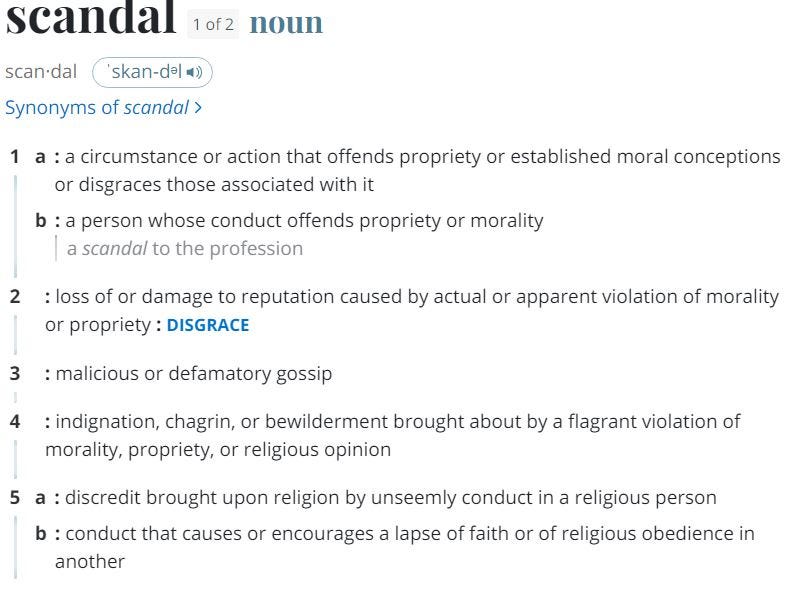Dearest Gentle Reader...I Did a Horrible Thing.
One Man's Confession of Sexual Assault
(Trigger warning: This article contains discussions of sexual assault which may be distressing to some readers. Reader discretion is advised.)
(It may be helpful to understand how we got on the road to where we’re going.)
I recently finished season 3 of Bridgerton. The series is something of a guilty pleasure for me.
If you’re unfamiliar, Bridgerton is a series on Max (formerly HBO). The period piece is set in Londons’s Regency era of the mid-late 1810s, and weaves tales of British High Society. “Dearest Gentle Reader,'' is the salutation of Lady Whistledown, a fictional gossip column serving as the source of all gossip and scandal for the ton1. Eventually, just who authors the column becomes a scandal in and of itself. Because, what kind of horrible person would write about everyone else’s secrets?
That’s basically what a scandal is, right? When a person is outed for nefarious…stuff?
I’ve been considering what, exactly, makes a scandal. While something might be scandalous, it’s not really a scandal until people know about the thing that happened. If nobody knows something happened, then nobody cares, and it — whatever it is — never becomes a scandal. Deep, dark secrets remain in the shadows to avoid becoming scandals.
Deep, dark secrets.
It’s been said everyone has them. I don’t know if it’s true or not, but the idea is somewhat comforting because I definitely have mine.
For the next few weeks, or however long it takes, I’m going to share this secret with the world.
I’ve been wanting to share it for some time now. It’s why I started this Substack.
While I’ve enjoyed writing for the past year and learned a lot about how to write online, you might consider all the work I’ve done to be a yearlong endeavor of running off-track.
I do have a concern about sharing this part of my past, but not for how it might affect the way people see me. The vast majority of the people in my life are graceful. I am well-loved. My parents surrounded me with people of genuine spirit, not fakes. These people would be sure to tell me that everyone has their stuff if I needed the comfort and reassurance.
The truth is, my concern is for my family. Mainly, my parents. What I did isn’t their fault. They didn’t raise me to act in the way I did. They were good parents, and you’d be lucky to have two people love you the way they loved me.
In fact, it was because of the values they instilled in me that I was eventually able to face my past. They’re the reason I believe in truth and integrity, a value instilled in me by my mother. I was quite young when she taught me about the importance of truth and integrity. There’s a whole cute story I’ll share with you soon about just how and when this happened. Of all the lessons I’ve ever learned anywhere, that’s the one I can point to and say, “My mother taught me that, and it’s the most important lesson I ever learned.”
Own Your Actions
The action I’m owning was a sexual assault. If you know me, then there are probably several reactions you’re experiencing. You might be feeling a combination of surprise and sadness. Perhaps there is even some denial or defensiveness for me. As I’ve shared my story in confidence with people I trust, they’ve often responded in ways that are meant to defend or protect me. I’m told that I’m being hard on myself, or something to that effect.
I appreciate their support. The fact is, sexual assault is a broad term, and it can be difficult to define just what it is. There are a lot of reasons for this including cultural, legal, and social complexities. The term encompasses a range of behaviors involving non-consensual sexual contact or behavior, but its definition can vary widely. As I’ve spoken with people about it, the complexities became clear.
I first began to take a hard look at the night it happened when I was studying for my graduate degree in College Student Affairs. We studied sexual assault on college campuses somewhat in depth. When I was working in Student Affairs I occasionally had to help students understand what sexual assault was. I later worked in college security and then was on staff in a college police department. The issue was always staring me in the face. While I appreciate people’s attempts to protect me, through my experience in these professions, I grew convinced.
I know what it was.
In the days I’ve spent confronting what I did, I’ve wondered what the legal ramifications would have been for me. Would I have faced jail? If so, would that have been followed by mandatory registration as a sex offender? These are hard questions to ask. I’ve often thought about how lucky I am. But “lucky” is a horrible word in this circumstance.
When it comes to legalities, I am lucky. But whatever the legal fallout might have been, it wouldn’t have done anything to address the debt I owe to my victim. “Luck” is the least empathetic word we might use.
I was lucky. She was not.
I was fortunate. She was not.
I made a choice. She did not.
I was/did … Well, you get the idea.
Time and time again, we see headlines for men who are accused of sexual assault of some sort. It’s always scandalous, and it’s always met with some sort of denial. From the vociferous I didn’t do that which begs Shakespeare’s, “[they] doth protest too much, methinks.” To, “I’m sorry I misinterpreted what she wanted.” I struggle to find one man who’s ever said, “She’s right. I did that. I’m sorry.”
I feel comfortable saying that somewhere north of 90% of the women I share my story with are unsurprised. They have a story of their own.
They’ll begin, “Yeah, something like that happened to me too.” Their story is always somewhat different than mine, but there’s always a victim, and the perpetrator is out there, living their life.
For every #metoo, there is also an “#Ididit.” For obvious reasons, that hashtag never caught on. Nobody is ever willing to say, “I did it.”
I can’t help but wonder… When are we men going to get in front of our actions? Why do we wait to be accused? And when we’re accused, why don’t we ever address it in a way that might bring healing?
It would be unfair and unwise to suggest all men are guilty of sexual assault2. Nonetheless, there are a lot of us out there who have hurt someone, and we’ve shown little public remorse until we’re already on the defensive.
The lesson my mother taught me about owning my actions goes straight to the heart of what it means to be a person of integrity. Further, integrity goes to the heart of what it means to be a good human. I happen to think the most masculine thing we can do is get in front of our wrongs before we’re forced to defend an act. We don’t all have to share the story like I am going to be doing for the next several weeks, but I think there are probably ways to confront our deepest secrets which will help bring healing.
Confession Leads to Healing
Among the most meaningful podcasts I’ve ever listened to was called The Confessional. It’s been some time since there was a new episode, but it’s worth listening to what was published in the past. Guests join host Nadia Bolz-Weber and confess their biggest regret. This confessional experience relieves the guest of the burden they’ve carried in silence. But the genius of the production is that it brings a sense of relief for the listener too. Episode after episode provided me with an understanding that confession is the first step in a longer restoration process.
By the time I discovered The Confessional I’d already long confessed to what I’d done. Not to a priest. Not to a pastor.
To my victim.
It was hard.
But it was worth it. She healed. I healed. We found a new sense of mutual respect and understanding for each other. She’s on board with this little writing project of mine, and you can be confident you’ll be hearing from her too.
In fact, she’ll see and have content editing privileges for every one of these posts before they hit your retinas or eardrums. Moreover, this very post you’re reading right now is the result of her advice to me to slow it down a bit. I was going to start with the next one. She reminded me that sharing the story will affect my readers, and it might be best to explain myself before dropping a bomb on them.
She gets a voice this time.
I don’t share my story to relieve myself of a burden. That happened years ago.
I share my story in hopes that maybe another man like me will read it and find a way to address what they did as well. I share it in hopes the healing my victim and I experienced will be an experience others may enjoy as well.
This…is why I write. May the story find its way to the reader’s heart. And may it be a small part of moving the world towards something better.
Likely, you have thoughts, questions, comments or concerns. The comment section right here on this article is the perfect place to leave them. Honestly, in the moment I’m typing these words — knowing I’m putting this out into the world — the quiet is deafening. A word or question from you will show this isn’t in vain.
I share this story with intention. The hope is that it helps men like me begin to address the things we’ve done. If you think this is an important thing for men to do - own our stuff - share it wherever you might. The easiest way is to click or tap the share button here. It is open to the public.
Finally, as I mentioned, this will be an ongoing story for the foreseeable future. Subscribe to follow along and see how my story and her story might inform yours.
Keep reading for the next installment in this story. In it, I drop the nuance of the term “sexual assault.”
The “ton” might best be described as London’s high society, or maybe, “well-born.” Basically the rich people who we all dream we were if we lived back in the London of the early 1800’s.
Of course, some women too.





Thank you. #Ididit could be helpful as a healing beginning. If you read my last post, you know how painful sexual assault is and it’s long lasting repercussions when never confessed, owned up to and admitted. It’s the first step as you said. Our education is biased. We talk about how many women are assaulted statistically, but not how many men do the assaulting. Where are the men teaching younger men this is not ok. Women unconsciously live as prey. Men unconsciously live as hunters. Your post and the following telling of your story will help the healing begin. Thank you.
While I cannot relate to the exact subject matter- on either side- I am going through some *stuff* (cleaned up word). I find your overall tone and intention resonating with me. Integrity. Honesty. Humility. Growth. Effing growth. I hate it. It’s annoying. And if you can learn and grow and get through it, maybe I can, too. Thanks, Jeff.